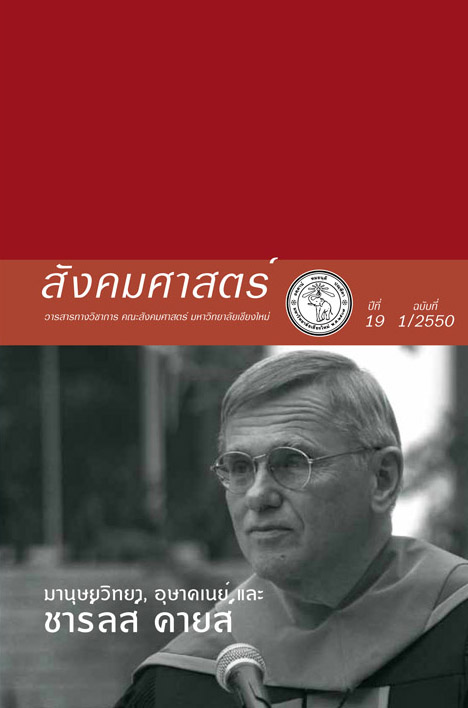Educational System and Language in the Thai Nation-State Building
Main Article Content
Abstract
Education and language are the main social phenomena interested Professor Charles F. Keyes, since both education and language are parts of technologies of power on leading Thailand, as a modern nation-state, to modernity. Also those become prominent mechanisms to gradually integrate people of diversified ethnic backgrounds throughout the country to become Thai. In this article, I examine two of Keyes’ main publications relevant to both issues, then summarize his main ideas, findings and recommendations. In addition, I give my personal opinion toward his works. On reading his two articles, it is my argument that his work on education was influenced by the concept of invention of tradition, by using the interpretive anthropology approach to conceptualize the article. For his article on language, it is the political anthropology approach that he adopted to study the power of state on constructing and expanding the central Thai to be standard Thai. On the other hand, he examines the power and roles of other languages in contemporary Thailand. According to Keyes, compulsory school and Buddhism are the two main mechanisms lead to the accomplishment of national ideology and standard Thai throughout the country.
Article Details
All written articles published on Journal of Social Sciences is its author’s opinion which is not belonged to Faculty of Social Sciences, Chiang Mai University or is not in a responsibility of the journal’s editorial committee’s members.
References
ธเนศวร์ เจริญเมือง (2542) 100 ปีสายสัมพันธ์สยาม-ล้านนา 2442-2542.เชียงใหม่: คณะสังคมศาสตร์ มหาวิทยาลัยเชียงใหม่.
นิธิ เอียวศรีวงศ์ (2538) “ภาษาไทยมาตรฐานกับการเมือง” ใน โขน, คาราบาว,น้ำเน่าและหนังไทย: ว่าด้วยเพลง, ภาษาและนานามหรสพ. กรุงเทพฯ:สำนักพิมพ์มติชน. หน้า136-171.
วัชระ สินธุประมา (2533) “ภาษาที่ใช้สอนและการสอนภาษาในโรงเรียนของมิชชันนารีทางภาคเหนือนับตั้งแต่เริ่มต้นจนถึงช่วงสงครามโลกครั้งที่สอง,”เฮอเบอร์ อาร์ สแวนสัน และประสิทธิ์ พงศ์อุดม (บรรณาธิการ) ศาสนาคริสต์ มิชชันนารี สังคมไทย เชียงใหม่: ฝ่ายประวัติศาสตร์ สภาคริสตจักรในประเทศไทย. หน้า 11-46.
วิทยาลัยครูสวนสุนันทา, คณะวิชาครุศาสตร์ (2532) การศึกษาไทย. กรุงเทพฯ:ห้างหุ้นส่วนจำกัด อรุณการพิมพ์
วุฒิชัย มูลศิลป์ (2516) การปฏิรูปการศึกษาในรัชกาลที่ 5 กรุงเทพฯ: สมาคมสังคมศาสตร์แห่งประเทศไทย.
______ (2525) “การปฏิรูปการศึกษาสมัยรัชกาลที่ 5 ถึง พ.ศ. 2475,” 200 ปีการศึกษาไทย. กรุงเทพฯ: กระทรวงศึกษาธิการ. หน้า 37-86.
สรัสวดี อ๋องสกุล (2529) ประวัติศาสตร์ล้านนา. เชียงใหม่: คณะมนุษยศาสตร์ มหาวิทยาลัยเชียงใหม่.
Anderson, Benedict (1983) Imagined Communities: Reflections on the Origin and Spread of Nationalism. London: Verso.
______ (1990) Language and Power: Exploring Political Cultures in Indonesia. Ithaca and London: Cornell University Press.
Bourdieu, Pierre and Jean-Claude Passeron (1977) Reproduction in Education, Society and Culture. London and Beverly Hills: Sage Publications.
Diller, Anthony (2002) “What makes central Thai a national language?,” in Craig J. Reynolds (ed.) National Identity and Its Defenders: Thailand Today, Chiang Mai: Silkworm Books, Pp. 71-107.
Inkeles, Alex (1974) “The School as a Context for Modernization,” in Alex Inkeles and Donald B. Holsinger (ed.) Education and Individual Modernity in Developing Countries, Leiden: E. J. Brill, Pp. 7-23.
Gramsci, Antonio (1971) Selections from the Prison Notebooks, ed. and tr. by Quinti Hoare and Geoffrey Nowell Smith. New York: International Publishers.
Hobsbawm, Eric (1983) “Introduction: Inventing Traditions,” in Eric Hobsbawm and Terence Ranger (eds.) The Invention of Tradition. Cambridge: Cambridge University Press, Pp. 1-14.
Keyes, Charles F. (1991a) “The Proposed World of the School: Thai Villagers’ Entry into a Bureaucratic State System,” in Charles F. Keyes (ed.) Reshaping Local Worlds: Formal Education and Cultural Change in Rural Southeast Asia, New Haven, Connecticut: Yale University Southeast Asia Studies, Pp. 89-130.
______ (1991b) “State Schools in Rural Communities: Reflections on Rural Education and Cultural Change in Southeast Asia,” in Charles F. Keyes (ed.) Reshaping Local Worlds: Formal Education and Cultural Change in Rural Southeast Asia, New Haven, Connecticut: Yale University Southeast Asia
Studies, Pp. 1-18.
______ (2003) “The Politics of Language in Thailand and Laos,” in Michael E. Brown and Sumit Ganguly (eds.) Fighting Worlds: Language Policy and Ethnic Relations in Asia, Cambridge, MA: The MIT Press, Pp. 177-210.
Simons, Anna (1997) “Political Anthropology” in Thomas Barfield (ed.) The Dictionary of Anthropology. Blackwell Publishing, Pp. 364-366.
Smalley, William A. (1994) Linguistic Diversity and National Unity: Language Ecology in Thailand. Chicago: University of Chicago Press.
Thongchai Winichakul (1994) Siam Mapped. Chiang Mai: Silkworm Books.
Wyatt, David K. (1969) The Politics of Reform in Thailand: Education in the Reign of King Chulalongkorn, New Haven: Yale University Press.


